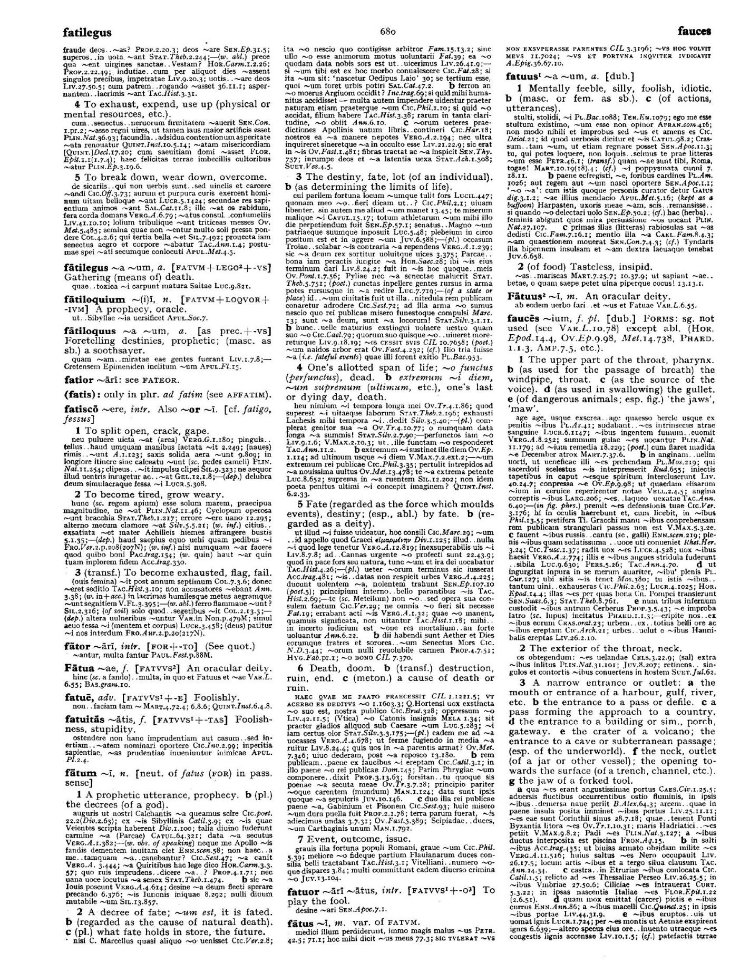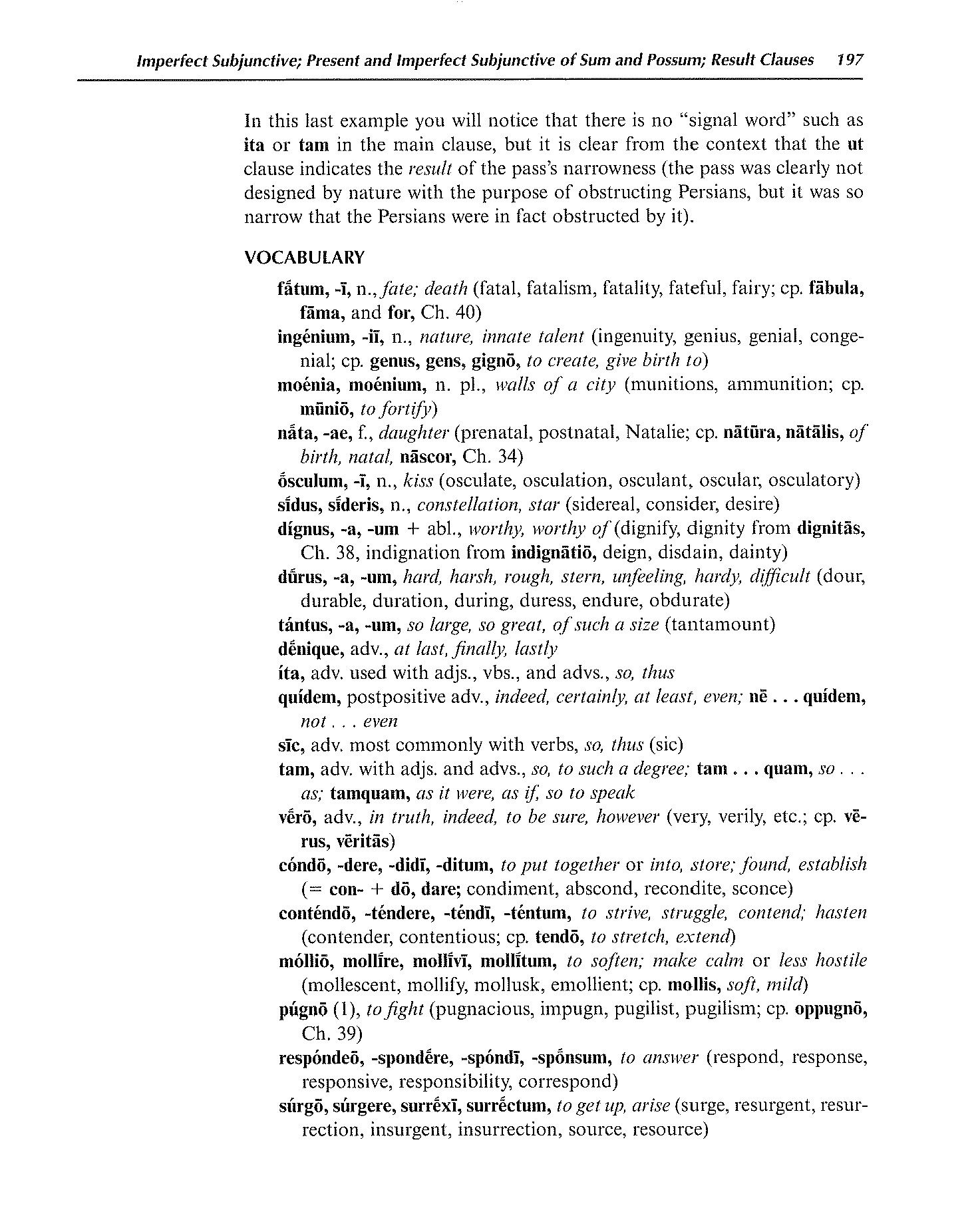
page_listing.tpl
page_subListingDetails.tpl
sub_listingDetails_style1.tpl
sub_listingDetails.title.tpl
fātum fate
fātum is a Latin Noun that primarily means fate.
Definitions for fātum
Wheelock's Latin
Noun
- 1
fate, death
English derivatives:
fatal fatalism fatality fateful fairy
Oxford Latin Dictionary
Noun
- 1
A prophetic utterance, prophecy. (b) (pl.) the decrees (of a god).
- 2
A decree of fate; ~um est, it is fated. (b) (regarded as the cause of natural death). (c) (pl.) what fate holds in store, the future.
- 3
The destiny, fate, lot (of an individual). (b) (as determining the limits of life).
Sentences with fātum
Latin to English
Sī post fāta venit glōria, nōn properō!Compare If glory comes (only) after death, Im in no hurry!
Heu, miserande puer, si qua fata aspera rumpas, tu Marcellus eris.Compare Alas, poor youth! If only you could escape your harsh fate! Marcellus you shall be.
Felix qui potuit rerum cognoscere causas, atque omnis et inexorabile fatum subiecit pedibus strepitumque Acherontis avari.Compare Lucky is he who can learn the roots of the universe, has mastered all his fears and fate's intransigence and the hungry clamor of hell.
Nescia mens hominum fati sortisque futurae et servare modum rebus sublata secundis!Compare Ah, mind of man, so ignorant of fate, of what shall befall him so weak to preserve moderation when riding the crest of good fortune!
Carmine divinas artis et conscia fati sidera diversos hominum varianta casus, caelestis rationis opus, deducere mundo aggredior. (Astronomica, I, 1)Compare Divining arts, and stars foreknowing fate varying the diverse turns of human state (The works of heaven's high reason) we bring down in verse, from Heaven.
Habent sua fata libelli. [De syllabis, 1, 1286]Compare Books have their own destiny.
Declension table for fātum
Cactus2000
| Singular | Plural | |
| Nom. | fātum | fāta |
| Gen. | fātī | fātōrum |
| Dat. | fātō | fātīs |
| Acc. | fātum | fāta |
| Abl. | fātō | fātīs |
Data sources
Notes
- Definitions
- Frederick M. Wheelock, Wheelock's Latin, 6th ed., rev. Richard A. LaFleur (New York, NY: HarperCollins Publishers, 2005): 197.
- P. G. W. Glare, Oxford Latin Dictionary, Vols. 1-8 (Oxford: Clarendon Press, 1982): 680.
- Word frequencies
- Christopher Francese, "Latin Core Vocabulary," Dickinson College Commentaries, last modified 2014, http://dcc.dickinson.edu.
- Paul B. Diederich, The Frequency of Latin Words and Their Endings, PhD diss., (Columbia University, 1939).
- Louis Delatte, Suzanne Govaerts, Joseph Denooz, and Etienne Evrard, Dictionnaire fréquentiel et index inverse de la langue latine [Frequency Dictionary and Inverse Index of the Latin Language] (Liège, Belgium: Laboratoire d'analyse statistique des langues anciennes de l'Université de Liège [L.A.S.L.A.], 1981): 121.
Bibliography
Allen, Joseph H. Allen and Greenough's New Latin Grammar for Schools and Colleges: Founded on Comparative Grammar. Edited by James B. Greenough, George L. Kittredge, Albert A. Howard, and Benjamin L. D'Ooge. Boston, MA: Ginn & Company, 1903.
Crystal, David. A Dictionary of Linguistics and Phonetics. 6th ed. Oxford, UK: Blackwell Publishing, 2008.
Delatte, Louis, Suzanne Govaerts, Joseph Denooz, and Etienne Evrard. Dictionnaire fréquentiel et index inverse de la langue latine [Frequency Dictionary and Inverse Index of the Latin Language]. Liège, Belgium: Laboratoire d'analyse statistique des langues anciennes de l'Université de Liège (L.A.S.L.A.), 1981.
Diederich, Paul B. The Frequency of Latin Words and Their Endings. PhD diss., Columbia University, 1939.
Francese, Christopher. "Latin Core Vocabulary." Dickinson College Commentaries. Last modified 2014. http://dcc.dickinson.edu/latin-vocabulary-list.
Gildersleeve, Basil L., and Gonzales Lodge. Gildersleeve's Latin Grammar: Third Edition, Revised, and Enlarged. 3rd ed. London, England: Macmillan and Co., 1903.
Glare, Peter G.W. Oxford Latin Dictionary. Vols. 1-8. Oxford, England: Clarendon Press, 1982.
Krüger, Bernd. "Latin Conjugation Tables." Cactus2000. Accessed May 5, 2023. https://latin.cactus2000.de/index.en.php.
Pierson, Nick. "Sound of Text." Accessed October 26, 2019. https://soundoftext.com.
Wheelock, Frederick M. Wheelock's Latin. 6th ed. Revised by Richard A. LaFleur. New York, NY: HarperCollins Publishers, 2005.
Wiktionary Contributors. "Victionarium." Wikimedia Foundation, Inc. Updated March 18, 2019. https://la.wiktionary.org/wiki/Victionarium:Pagina_prima.
Citation
Chicago (17th ed.)
Allo Contributors. "fātum, fātī (n.) - Latin Word Definition." Allo Latin Dictionary. Last modified . Accessed February 20, 2026. http://ancientlanguages.org/latin/dictionary/fatum-fati.
Entry created on . Last updated on .







